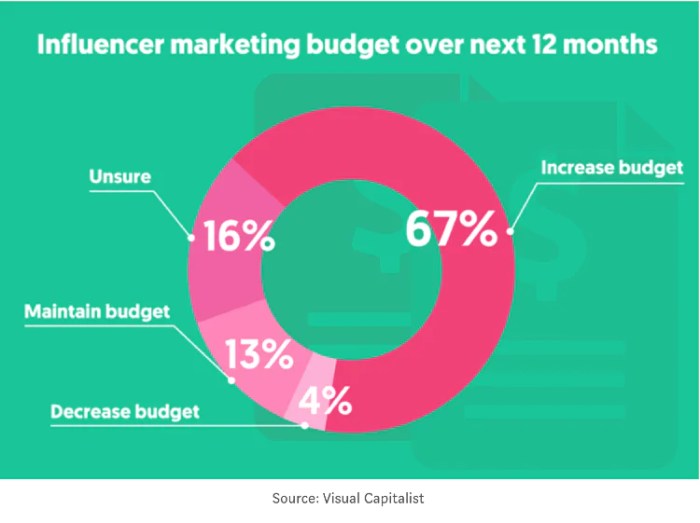Best Practices in Influencer Marketing dives into the world of social media influencers, shedding light on the key strategies and tactics needed to excel in this dynamic field. Whether you’re a brand looking to collaborate with influencers or an aspiring influencer yourself, this guide has got you covered.
From selecting the right influencers to creating compelling campaigns and navigating legal considerations, this comprehensive overview will equip you with the knowledge and tools necessary to thrive in the realm of influencer marketing. Get ready to elevate your brand and reach new heights of success in the digital landscape.
Overview of Influencer Marketing

Influencer marketing is a form of marketing where brands collaborate with individuals who have a strong influence over a specific audience. These influencers have the power to affect purchasing decisions and drive engagement through their social media presence. In today’s digital age, influencer marketing has become a vital strategy for brands to reach their target audiences in a more authentic and relatable way.
Examples of Successful Influencer Marketing Campaigns
- The collaboration between Nike and Cristiano Ronaldo, leveraging his massive following to promote their sports products.
- Sephora partnering with beauty influencers to showcase their new makeup line, reaching a wider audience of beauty enthusiasts.
- Daniel Wellington’s influencer campaign, utilizing micro-influencers to create a buzz around their minimalist watches.
Different Types of Influencers and Their Roles
- Celebrity Influencers: Well-known figures in entertainment, sports, or other industries who have a large following.
- Micro-Influencers: Individuals with a smaller but highly engaged audience within a specific niche.
- Macro-Influencers: Influencers with a larger following than micro-influencers but not as massive as celebrities.
Impact of Influencer Marketing on Brand Awareness and Sales
Influencer marketing can significantly impact brand awareness by exposing the brand to a larger audience through the influencer’s social media channels. Additionally, influencers can drive sales by recommending products or services to their followers, who trust their opinions and recommendations.
Identifying the Right Influencers
In the world of influencer marketing, choosing the right influencers for your campaign is crucial to its success. Here’s how you can go about selecting the perfect influencers for your brand:
Aligning Influencer Values with Brand Values
When selecting influencers, it’s essential to ensure that their values align with your brand’s values. This alignment helps in maintaining authenticity and credibility, leading to a more effective partnership.
Considering Engagement Rates and Audience Demographics, Best Practices in Influencer Marketing
Before finalizing influencers, it’s crucial to analyze their engagement rates and audience demographics. High engagement rates indicate an active and loyal following, while matching audience demographics with your target market ensures maximum impact.
Researching and Vetting Potential Influencers
To find the right influencers, conduct thorough research on their content, engagement, and audience demographics. Vetting potential influencers involves checking for authenticity, past collaborations, and overall reputation in the industry.
Creating Effective Campaign Strategies: Best Practices In Influencer Marketing

Influencer marketing campaigns can be powerful tools for brands to reach their target audience and drive engagement. Developing an effective campaign strategy involves several key steps to ensure success.
Setting Clear Campaign Objectives and KPIs
Setting clear campaign objectives and key performance indicators (KPIs) is crucial for measuring the success of an influencer marketing campaign. These objectives should be specific, measurable, achievable, relevant, and time-bound (SMART). KPIs such as reach, engagement, conversion rates, and ROI can help track the performance of the campaign.
- Define the goals of the campaign, whether it’s to increase brand awareness, drive sales, or improve brand perception.
- Identify the target audience and determine the key metrics that will indicate the success of the campaign.
- Establish a timeline for the campaign and set benchmarks for measuring progress towards the goals.
- Regularly monitor and analyze the performance of the campaign against the set objectives and KPIs to make necessary adjustments.
Creating Authentic and Engaging Content
Authenticity is key in influencer marketing, as audiences are more likely to trust and engage with content that feels genuine. Here are some tips for creating authentic and engaging content for influencers to promote:
- Encourage influencers to create content that aligns with their personal brand and resonates with their followers.
- Avoid overly promotional or sales-focused content, and instead focus on storytelling and building a connection with the audience.
- Utilize user-generated content and behind-the-scenes glimpses to add a personal touch to the campaign.
- Collaborate with influencers to co-create content that showcases the brand in an authentic and relatable way.
Establishing a Win-Win Partnership with Influencers
Building a strong and mutually beneficial partnership with influencers is essential for the success of an influencer marketing campaign. Here’s how to establish a win-win relationship with influencers:
- Clearly communicate expectations, deliverables, and compensation with influencers to ensure transparency and alignment.
- Provide influencers with creative freedom to showcase their unique voice and style while staying true to the brand’s messaging.
- Offer ongoing support and collaboration throughout the campaign to maintain a positive relationship with influencers.
- Recognize and appreciate the contributions of influencers through incentives, shoutouts, and other forms of acknowledgment.
Legal and Ethical Considerations
As influencer marketing continues to grow in popularity, it is crucial to understand the legal and ethical guidelines that govern this industry. From disclosing paid partnerships to ensuring authenticity in collaborations, here are some key considerations to keep in mind.
Disclosure of Paid Partnerships
- According to the Federal Trade Commission (FTC), influencers must clearly disclose any paid partnerships or sponsored content. This includes using hashtags like #ad or #sponsored to indicate that the post is a paid promotion.
- Failure to disclose paid partnerships can lead to fines and legal consequences for both influencers and brands involved in the collaboration.
Ensuring Transparency and Authenticity
- Transparency is essential in influencer marketing to maintain trust with the audience. Influencers should be upfront about their relationships with brands and the products they promote.
- Avoid misleading or deceptive practices, such as promoting products without disclosing any form of compensation received.
Examples of Brands Facing Backlash
- In 2019, the fashion brand Revolve faced criticism for a lack of transparency in their influencer campaigns. The brand was accused of promoting unrealistic beauty standards and failing to disclose paid partnerships adequately.
- Another example is the Fyre Festival scandal, where influencers promoted the event without disclosing their involvement in the marketing campaign. This led to a major backlash against both the influencers and the festival organizers.
